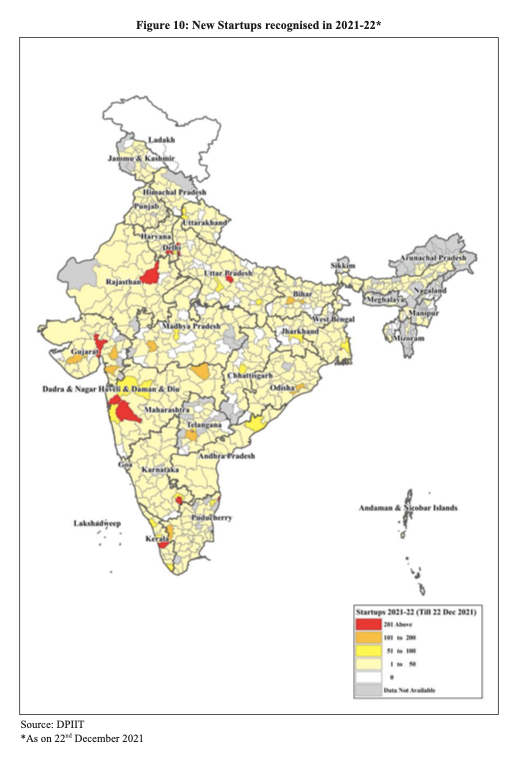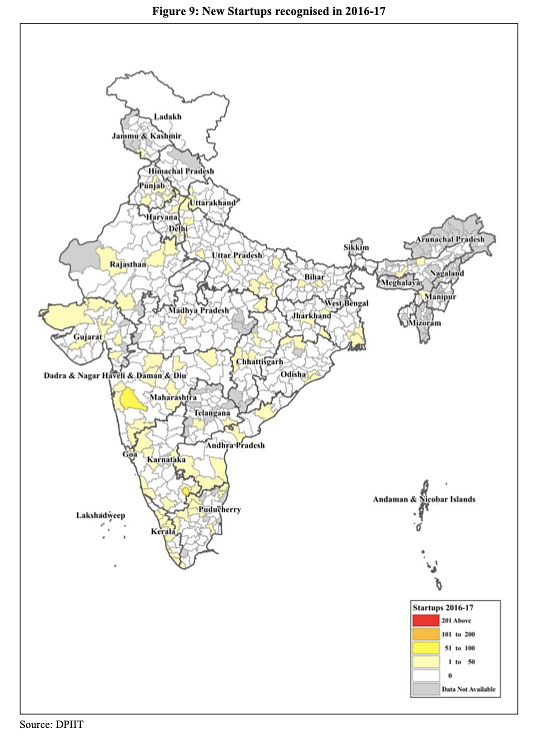Delhi had added more recognised startups between April 2019 and December 2021 than Bengaluru, according to the Economic Survey 2021-22, released by the Ministry of Finance on Monday.
While Delhi added more than 5,000 startups that have registered with Startup India under the Department for Promotion of Industry and Internal Trade (DPIIT), the corresponding number for Bengaluru stood at 4,514 for the period between April 2019 and December 2021.
Maharashtra has the highest number of recognised startups (11,308), according to the Economic Survey 2021-22, which gets released a day before the Union Budget every year.
The Economic Survey also took note of a record number of startups (44) that reached unicorn status in 2021. The term 'unicorn' refers to privately-funded tech startups whose valuations are more than $1 billion.
India overtook the United Kingdom to emerge as the third-highest country in the number of unicorns after the United States of America and China (which added 487 and 301 unicorns respectively in 2021).
"As of January 14, 2022, India has 83 unicorns with a total valuation of $277.77 billion," according to the Economic Survey 2021-22.
"The year 2021-22 so far has been an exceptional year for the primary markets with a boom in fundraising through IPOs (initial public offerings) by many new-age companies or tech startups or unicorns," it added.

Source: Economic Survey 2021-22
Deeper roots of emerging startups
Even the number of startups recognised by DPIIT has grown by nearly 20 times in five years.
The Economic Survey 2021-22 features a regional comparison of the recognised startups in 2016-17 (733 startups) versus 2021-22 (more than 14,000).
As a result, more than 61,400 startups have been recognised in India as of January 10, 2022, the Economic Survey noted.
Furthermore, 555 districts in India had at least one new startup in 2021, compared to 121 districts that had at least one new startup in 2016-17, the Economic Survey 2021-22 added.

Source: Economic Survey 2021-22
Green shoots in spacetech
In another heartening finding, it pointed to an increase in the number of startups in the space sector.
Of 101 recognised space startups in the past decade, 47 were added in 2021, and 21 in 2020, according to the Economic Survey, attributing the change to space reforms in 2020.
"Government undertook reforms in space sector in 2020, which envisage the private sector to act as a co-traveller in the exploration of outer space and also in providing space-based services," the Economic Survey stated.
It also pointed to the creation of an independent nodal agency under the Department of Space (DOS), Indian National Space Promotion and Authorization Centre (IN-SPACe), which shall act as the promoter and regulator of space activities in India by NGPEs (Non-government/ private entities).
"It shall also allow utilization of capital-intensive DOS-owned facilities at reasonable cost by the private sector. In a little over a year since the agency was announced, the interim IN-SPACe board has received close to 40 proposals from large industries, MSMEs, startups and academia covering a broad range of activities in space domain – cutting across both upstream (launch vehicle/satellite manufacturing) as well as downstream (Earth Observation applications, communications, etc)," according to the Economic Survey.
Edited by Saheli Sen Gupta


